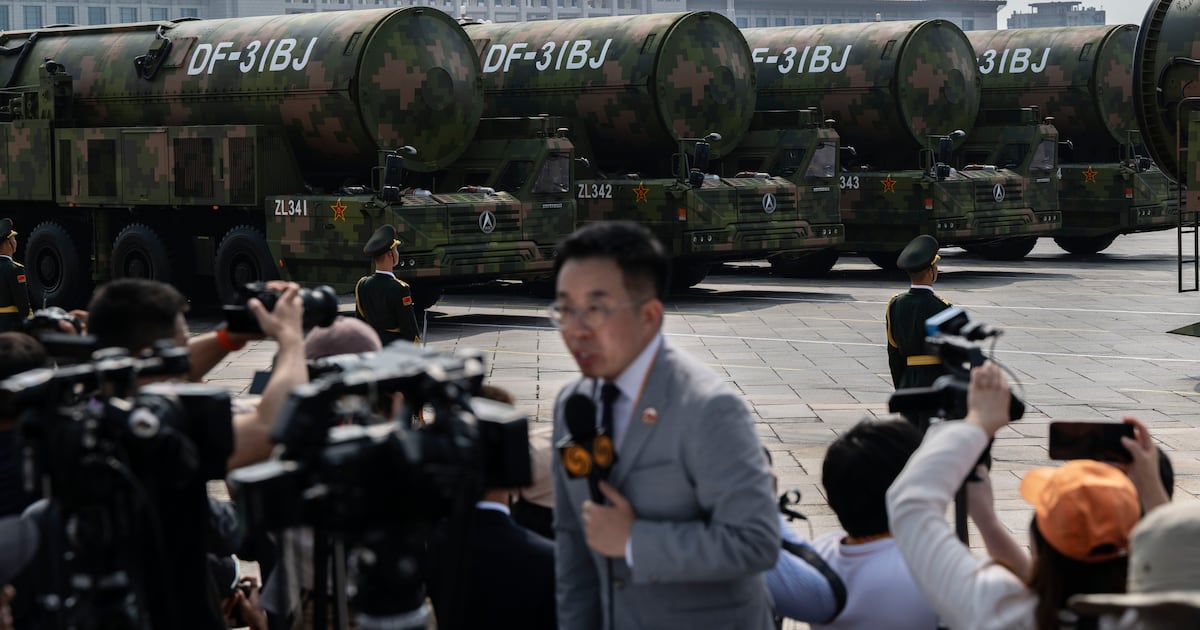World
China Positions as Stability Champion Amid Global Unrest

In a significant display of military prowess and diplomatic engagement, China hosted the Xiangshan Forum this week in Beijing. Over the course of three days, approximately 1,800 military officers, diplomats, and academics from 100 countries gathered to discuss topics ranging from advanced military technology to the legacy of World War II. The forum unfolded against the backdrop of two notable events: Donald Trump’s potential return to the White House and a recent massive military parade held in Tiananmen Square.
During the forum, China’s Defence Minister, Dong Jun, assured attendees that the global community had little to fear from a more powerful People’s Liberation Army (PLA). He articulated that China’s military strategy is rooted in the principles of peaceful development and security partnerships based on equality and cooperation. Dong stated, “The stronger the PLA becomes, the stronger the power to constrain war will grow, and the more assured world peace and development will be.”
The military parade on September 3, 2023, commemorating the 80th anniversary of the end of World War II, showcased China’s advanced military capabilities. This included the unveiling of new fighter jets, hypersonic missiles, and AI-powered drones. For the first time, China demonstrated its nuclear capabilities with the introduction of air-launched and land-based intercontinental ballistic missiles, joining the United States and Russia in possessing a nuclear triad.
The parade coincided with a meeting of the Shanghai Cooperation Organisation (SCO), where leaders including Xi Jinping, Vladimir Putin, and Narendra Modi underscored the shifting dynamics of global power. Analysts view these events as indicative of a reordering of international relations, accelerated by Trump’s foreign policy decisions over the past year.
Choi Shing Kwok, Director of the ASEAN Studies Centre at the ISEAS-Yusof Ishak Institute in Singapore, remarked that while Southeast Asian nations were not surprised by Trump’s withdrawal from international treaties, the extent of imposed tariffs had significant implications for the region’s development model. He highlighted the need for countries to seek alternative partnerships as the U.S. disengages from its previous trade relationships, suggesting that nations within ASEAN, as well as Europe, the Gulf Cooperation Council (GCC), and BRICS, will look for new avenues for economic integration.
At the forum, Chinese officials also promoted Xi’s Global Governance Initiative (GGI), which aims to reinforce a United Nations-centered international system. While this initiative has garnered support from parts of the Global South, critics in the West argue that the proposed order lacks clear institutional frameworks, making it potentially ineffective.
Chinese experts tended to downplay the notion of a rapidly declining U.S. influence. Da Wei, a professor of social sciences at Tsinghua University, stated that China is not positioned to replace the U.S. as the dominant global power. He maintained that, even if such a transition were possible, China would not seek to impose its political system on others. “The U.S. viewed the world from a perspective of singular values, believing that if you don’t accept them, sanctions will follow,” he explained. “This missionary tradition is not a Chinese perspective.”
As tensions between Beijing and Washington have intensified over the past decade, Da emphasized that the discord should not be attributed solely to either party. He proposed that the decline of globalization, which previously underpinned their relationship, has contributed to the current challenges. “If we acknowledge that times have changed, and globalization has ended, we can reassess our relationship in this new era,” he noted.
The discussions also addressed the ongoing conflict in Ukraine. During a panel on local conflict resolution, Oleksandr Chalyi, a former deputy foreign minister of Ukraine and advisor to President Volodymyr Zelenskiy, shared insights from the protracted war. He pointed out that as the conflict extends, military resolutions become less feasible, emphasizing the need for a political settlement. “A sustainable political resolution in Ukraine is linked to broader European and global security issues,” he stated, underscoring the necessity for active negotiation involving the U.S., the EU, and China.
Feng Zhongping, Director General of the Institute of European Studies at the Chinese Academy of Social Sciences, highlighted Europe’s precarious security situation, noting that confidence in U.S. support through NATO obligations has waned amid tensions with Russia. He urged European nations to learn from post-World War II cooperation between Germany and France, suggesting that a long-term peace strategy must also consider future relations with Russia, despite current hostilities. “Europe faces a critical choice: to seek sustainable peace or to continue down a path of conflict,” he concluded.
The discussions at the Xiangshan Forum reflect China’s strategic positioning in a rapidly changing geopolitical landscape, emphasizing its role as a proponent of stability and cooperation in an uncertain global environment.
-

 Top Stories2 months ago
Top Stories2 months agoTributes Surge for 9-Year-Old Leon Briody After Cancer Battle
-

 Entertainment3 months ago
Entertainment3 months agoAimee Osbourne Joins Family for Emotional Tribute to Ozzy
-

 Politics3 months ago
Politics3 months agoDanny Healy-Rae Considers Complaint After Altercation with Garda
-

 Top Stories3 months ago
Top Stories3 months agoIreland Enjoys Summer Heat as Hurricane Erin Approaches Atlantic
-

 World4 months ago
World4 months agoHawaii Commemorates 80 Years Since Hiroshima Bombing with Ceremony
-

 Top Stories2 months ago
Top Stories2 months agoNewcastle West Woman Patricia Foley Found Safe After Urgent Search
-

 Top Stories4 months ago
Top Stories4 months agoFianna Fáil TDs Urgently Consider Maire Geoghegan-Quinn for Presidency
-

 World4 months ago
World4 months agoGaza Aid Distribution Tragedy: 20 Killed Amid Ongoing Violence
-

 World4 months ago
World4 months agoCouple Convicted of Murdering Two-Year-Old Grandson in Wales
-

 World4 months ago
World4 months agoAristocrat Constance Marten and Partner Convicted of Infant Murder
-

 Top Stories3 months ago
Top Stories3 months agoClimbing Errigal: A Must-Do Summer Adventure in Donegal
-

 Top Stories3 months ago
Top Stories3 months agoHike Donegal’s Errigal Mountain NOW for Unforgettable Summer Views









